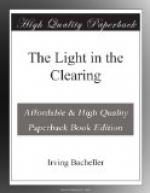The woman turned with a kindly smile and sat down in the grass again and took the sheet of paper and resting it on a yellow-covered book began to write these words:
“I see the longing of the helper. One, two, three, four great perils shall strike at him. He shall not be afraid. God shall fill his heart with laughter. I hear guns, I hear many voices. His name is in them. He shall be strong. The powers of darkness shall fear him, he shall be a lawmaker and the friend of God and of many people, and great men shall bow to his judgment and he shall—”
She began shaking her head thoughtfully and did not finish the sentence, and by and by the notion came to me that some unpleasant vision must have halted her pencil.
Aunt Deel brought some luncheon wrapped in paper and the old woman took it and went away. My aunt folded the sheets and put them in her trunk and we thought no more of them until—but we shall know soon what reminded us of the prophet woman.
The autumn passed swiftly. I went to the village one Saturday with Uncle Peabody in high hope of seeing the Dunkelbergs, but at their door we learned that they had gone up the river on a picnic. What a blow it was to me! Tears flowed down my cheeks as I clung to my uncle’s hand and walked back to the main street of the village. A squad of small boys jeered and stuck out their tongues at me. It was pity for my sorrows, no doubt, that led Uncle Peabody to take me to the tavern for dinner, where they were assuaged by cakes and jellies and chicken pie.
When we came out of the tavern we saw Benjamin Grimshaw and his son Amos sitting on the well curb. Each had a half-eaten doughnut in one hand and an apple in the other. I remember that Mr. Grimshaw said in a scolding manner which made me dislike him:
“Baynes, I’m glad to see you’re so prosperous. Only the rich can afford to eat in taverns. Our dinner has cost us just three cents, an’ I wouldn’t wonder if I was worth about as much as you are.”
My uncle made no reply and we passed on to a store nearly opposite the well, where I became deeply interested in a man who had tapped me in the stomach with his forefinger while he made a sound like the squealing of a rat. Then he said to Uncle Peabody:
“Look at that man out there by the well! He’s the richest man in this section o’ country. He owns half o’ this village. I wouldn’t wonder if he was worth fifty thousand dollars at least. What do ye suppose he spent for his dinner?”
“Three cents,” said my uncle.
“Guess again—it was a cent and a half. He came in here and asked how much were the doughnuts. I told him they were a cent a piece. He offered me three cents for four of them—said it was all the change he had. He and his boy are eating them with some apples that they had in their pockets.”
I remember how my uncle and the man laughed as the latter said: “His wealth costs too much altogether. ’Tain’t worth it”—a saying which my uncle often quoted.




